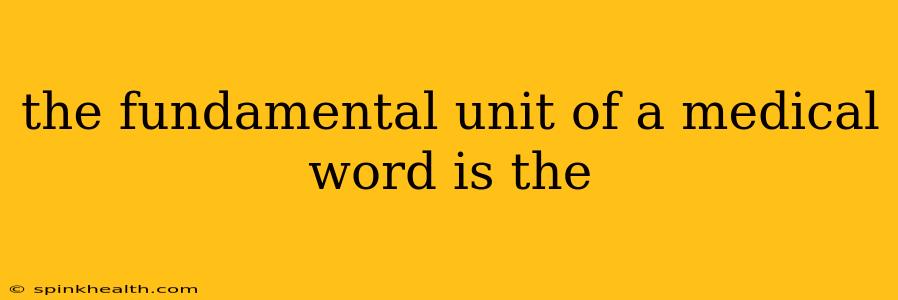The Fundamental Unit of a Medical Word: Unlocking the Secrets of Medical Terminology
Have you ever looked at a medical term and felt completely overwhelmed? Like staring at a foreign language you've never encountered? You're not alone! The seemingly complex world of medical terminology can be daunting, but understanding its building blocks makes it significantly more manageable. The fundamental unit of a medical word is, quite simply, the word root.
Think of word roots as the core meaning of a medical term. They're the foundation upon which prefixes and suffixes are built, much like a house is built upon its foundation. These roots often originate from Greek or Latin, languages that formed the basis of much scientific vocabulary. Mastering these roots is the key to unlocking the meaning of thousands of medical terms.
Let's embark on a journey to explore this fascinating world, addressing some common questions along the way.
What are word roots in medical terminology?
Word roots are the foundational elements of medical terms, carrying the core meaning. For example, the root "cardi" refers to the heart. So, a word like "cardiology" immediately suggests a study related to the heart. Similarly, "hepato" relates to the liver, so "hepatitis" signifies an inflammation of the liver. Understanding these roots provides a quick pathway to comprehension.
What are prefixes and suffixes in medical terminology?
While word roots provide the core meaning, prefixes and suffixes modify that meaning, adding layers of detail. Prefixes are added to the beginning of a word root, and suffixes are added to the end. A prefix might indicate location ("intra-" meaning within), quantity ("poly-" meaning many), or negation ("a-" meaning without). A suffix often specifies a procedure ("-ectomy" meaning surgical removal), condition ("-itis" meaning inflammation), or profession ("-ologist" meaning specialist).
How do prefixes, suffixes, and word roots combine to form medical terms?
Let's take the term "gastritis" as an example. "Gastr" (word root) means stomach, and "-itis" (suffix) means inflammation. Therefore, "gastritis" means inflammation of the stomach. Another example: "cardiomyopathy." "Cardio" (word root) means heart, "myo" (word root) means muscle, and "-pathy" (suffix) means disease. Thus, "cardiomyopathy" describes a disease of the heart muscle.
How can learning medical terminology help healthcare professionals?
Mastering medical terminology is crucial for healthcare professionals. Precise communication is vital in healthcare, and understanding terminology ensures accuracy in patient records, diagnoses, and treatment plans. Misunderstandings can have severe consequences, and a strong grasp of medical terminology minimizes the risk of errors.
Why is it important for patients to understand medical terminology?
While not to the same extent as healthcare professionals, basic understanding of medical terminology empowers patients. It improves communication with doctors and nurses, allowing for more informed participation in healthcare decisions. Understanding medical reports and instructions becomes easier, leading to better patient outcomes.
Where can I learn more about medical terminology?
Numerous resources exist to assist in learning medical terminology. Textbooks, online courses, flashcards, and medical dictionaries are readily available, catering to various learning styles and levels of expertise. Engaging with these resources actively and consistently is key to building a solid foundation.
The journey of mastering medical terminology is a continuous process of learning and application. It's not about memorizing endless lists but about understanding the logical construction of medical words. By focusing on the fundamental unit—the word root—and the modifying roles of prefixes and suffixes, the seemingly daunting landscape of medical terms transforms into a comprehensible and fascinating world.

